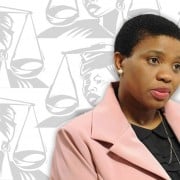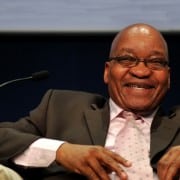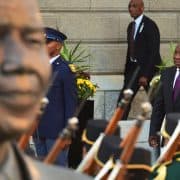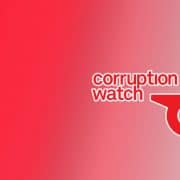|
Getting your Trinity Audio player ready...
|
By Judith February
Last week, Advocate Nomgcobo Jiba, deputy national director of Public Prosecutions, head of the Special Commercial Crimes Unit Advocate Lawrence Mrwebi and Hawks head Mthandazo Berning Ntlemeza appeared before Parliament’s Public Accounts committee. As they spoke about the state’s capacity to fight corruption, their words were lost in a haze, for the trio represented something akin to a Rogue’s Gallery.
In the same week, the Pretoria High Court ordered that both Jiba and Mrwebi be scrapped from the roll of advocates. Jiba specifically has been accused of blocking any attempts to charge President Zuma with corruption and fraud. She was instrumental in protecting former head of Crime Intelligence, Richard Mdluli, from prosecution and relentlessly pursued KwaZulu-Natal’s Hawks head Johan Booysen who was investigating Thoshan Panday, a close Zuma associate and businessman.
Judge Legodi found both Mrwebi and Jiba “unfit” to serve in their positions. He had some choice words for both of them. As for Ntlemeza, the North Gauteng High Court found him to be unfit to hold his position. In fact, Justice Matojane said Ntlemeza was “biased, dishonest and lacks integrity and honour” and found that he made false statements under oath.
While the details are important, the over-arching narrative is the same. The president needs to be protected at all costs. As his term nears its end and as the ANC’s own elective conference looms in 2017, Zuma has become a man desperate to protect himself from criminal prosecution. To achieve that goal, he needs to appoint the likes of Jiba, Mrwebi, Ntlemeza and NPA Head Shaun Abrahams (who promoted Jiba in a restructuring of the NPA) to do his bidding.
We have seen that in pursuit of that goal, Zuma is perfectly prepared to undermine institutions of democracy. Nkandla, the appointment of SABC COO Hlaudi Motsoeneng, SABC board chairperson Dudu Miyeni, the firing of finance minister Nhlanhla Nene, and the Hawks’ hounding of current finance minister Pravin Gordhan, are all part of this predictable but dangerous narrative.
Public Protector Thuli Madonsela dug her heels in and finally there was some accountability regarding Nkandla, but not before Parliament and the courts were dragged into the unholy mess of corruption.
And so in this environment of impunity it is hard for Zuma to lead with any form of legitimacy. South Africans simply have no more faith that he and his band of corrupt sidekicks have the interests of the country at heart. Impunity thus seeps into the very heart of society.
This week, Higher Education minister Blade Nzimande finally intervened on the issue of university fee increases for 2017. He did so against the backdrop of a near countrywide shutdown of universities and continuing protests often marred by intolerance and violence.
Nzimande made a perfectly reasonable suggestion, which is worth engaging with. Universities would set their own fee increases capped at 8% but those in the “missing middle” and the poor would be spared the increases.
He had barely finished speaking when some student groups rejected the proposal.
A difficult problem
Essentially, the immediate demand is free tertiary education for all – now. It is very difficult, nigh impossible, to figure out how government might be able to accede to such a request immediately. Even in developed countries that are far wealthier than South Africa and with few of the intractable social challenges we have, university tuition is seldom free.
One senses that a bigger conversation needs to happen as regards what kind of tertiary options young South Africans have and also what funding models should exist. This by its very nature is a complex discussion and will not, with the best will in the world, be solved overnight.
There have been calls from some to call a cross-sectoral summit to deal with the issue of tertiary education once and for all. This would need to include academics, student bodies, trade unions, civil society, the state and business. However, for this to happen there have to be certain ground rules of engagement such as a cessation of violence and intimidation as well as an understanding that in any negotiation, there are no outright winners.
But is the political temperature right for this and who will lead it?
In the age of unreason there has been little attempt to engage with the substance of the fee structures and other related issues proposed by Nzimande. What is worth taking away is that the wealthy should pay and the poor should be assisted. But as ever, the devil is in the detail. What might come of the work of the Fees Commission, and is its work doomed from the start, one wonders? In Cape Town the hearings were disrupted by students acting as gatekeepers to the debate.
On Tuesday universities were again left to deal with protesting students. At UCT, students barricaded entrances and demanded an end to disciplinary action being taken against students who had previously been involved in protests.
Students not above censure
Why is it that students involved in burning, barricading and intimidation believe they are above censure? Calling for disciplinary action is not condoning police or security brutality, yet somewhere, somehow, a line must be drawn in the sand. It might well be an unpopular or politically incorrect position to take but how can universities afford not to?
Some images on social media reflect the intolerance and have been entirely unedifying. In one, a senior professor of UCT’s law faculty is seen fighting off students who appear to want to disrupt a class. The situation is unclear but there is shouting and taunting. What one sees next is the woman professor jumping on lecture desks engaging a fire extinguisher to ensure that she is heard while a group of students dances on desks, one holding a loudhailer.
In another video a student is seen standing on a desk in a lecture hall and hitting a fellow student with a sjambok. A daily newspaper in Cape Town carried a sobering image of a student standing on a library table at UCT forcing everyone to switch off their computers and leave the building.
Is this an institution of higher learning, one asks, and is this democracy’s essence? It looks a lot like tyranny.
And is this the same law faculty where future lawyers are to be taught to raise the level of their argument and not their voice? The riposte may be that the indignity of poverty is far greater. This much is true as former Constitutional Court justice Albie Sachs always reminds us – a society in which there is nowhere for someone to lay her head is not one which holds fast to the notion of dignity. Yet, the university itself is the place to grapple with such complexity and make the argument without having to resort to violence and intimidation.
Is this the only way protesters have of achieving their aims?
The age of unreason and impunity
But we are in the age of unreason and impunity where talk is cheap and dialogue is passé. The “politics of now” is urgent and destruction is justified.
In all of this, vice-chancellors have been hung out to dry while Nzimande and many of his colleagues seem weak and lily-livered. Who can forget Nzimande’s inability to address students who entered Parliament in a #feesmustfall march last year? That he was completely lost as to how to respond was telling. He, Zuma and the rest of the Cabinet sneaked out of the back entrance of Parliament in their shiny cars.
In an age of such impunity and where those in power continue to milk state coffers dry, it becomes very hard for the state to take any sort of moral high ground.
How does Nzimande tell students the coffers are empty when they see the excesses of Nkandla, the multibillion rand nuclear deal often benefiting Zuma’s cronies, and SAA being bailed out to the tune of billions simply because Dudu Miyeni is close to Zuma? How does Nzimande say there is no money when those like Jiba, Mrwebi and Ntlemeza protect those who siphon money from the public purse?
How does one appeal to reason when unreason has taken over and Hlaudi Motsoeneng uses public money to protect his position, pays for praise singers to prop him up, and is supported by Zuma?
And of course, a minister of police trying to convince us that a fire pool is a swimming pool perhaps best illustrates the age of unreason.
So if students are engaged in conduct which often descends into plain thuggery, we need look no further than our political leadership which now lacks the authority and legitimacy to intervene in situations which require intricate problem-solving.
Where does it all end? The question used to be whether Pravin Gordhan would survive. Maybe that is yesterday’s question. Today’s question is whether the Zuma-led government has any credibility to prevent the edifice of our institutions from being torn down by those who see themselves as having no stake in the very society in which they live.
• First published on Daily Maverick.
• Judith February is based at the Institute for Security Studies. Prior to that she was executive director of the HSRC’s Democracy and Governance unit and also head of Idasa’s South African Governance programme for 12 years.








